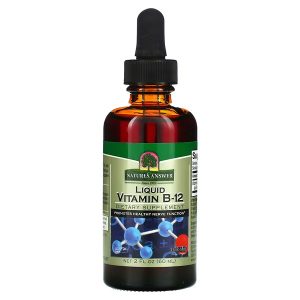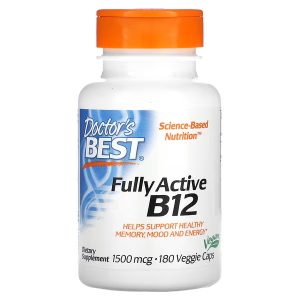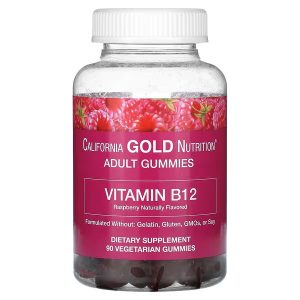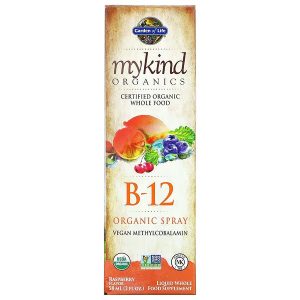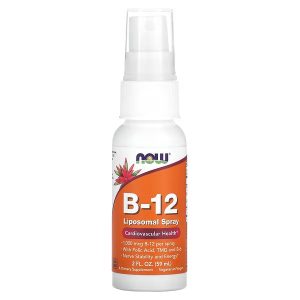The Comprehensive Guide to Vitamin B12: Benefits, Dosages, and Supplements
Vitamin B12, also known as cobalamin, is an essential nutrient with numerous health benefits. This article provides a detailed look into Vitamin B12, including its advantages, recommended dosages, supplement types, and potential side effects.
Consider the significant impact of Vitamin B12 deficiency as illustrated by a case reported by Harvard Health Publishing and staff from Harvard Health. In a span of just two months, a 62-year-old individual experienced a series of alarming health issues: numbness and a ‘pins and needles’ sensation in his hands, difficulty in walking, severe joint pain, a noticeable yellowing of the skin, and increasing shortness of breath. This array of symptoms was traced back to a critical lack of Vitamin B12, as detailed in a case study from the Massachusetts General Hospital, an affiliate of Harvard, and published in The New England Journal of Medicine. The case underscores the potential severity of Vitamin B12 deficiency, which, if left unchecked, can escalate to profound depression, paranoia, delusions, memory loss, incontinence, and even a loss of taste and smell.
Symptoms of Vitamin B12 Deficiency
Vitamin B12 deficiency can manifest in various ways, affecting multiple body systems. Identifying these symptoms early is essential for timely intervention. Common signs of deficiency include:
- Fatigue and Weakness: One of the earliest and most common symptoms, resulting from decreased red blood cell production.
- Shortness of Breath and Dizziness: These symptoms occur due to the body’s reduced oxygen-carrying capacity.
- Pale or Jaundiced Skin: A deficiency in Vitamin B12 can lead to a noticeable paleness or slight yellowing of the skin.
- Sensory Changes: Numbness, tingling, or a pins and needles sensation, particularly in the hands and feet, may indicate nerve damage from a lack of Vitamin B12.
- Mobility Issues: In severe cases, balance and coordination can be affected, increasing the risk of falls.
- Glossitis and Mouth Ulcers: A swollen, inflamed tongue and mouth ulcers can be a sign of B12 deficiency.
- Cognitive Difficulties: Problems with memory, understanding, or judgment, which might be mistaken for dementia in older adults.
- Psychological Issues: Changes in mood, including depression and irritability, can be linked to B12 deficiency.
- Digestive Problems: Some individuals may experience nausea, vomiting, constipation, or diarrhea.
- Heart Palpitations: An irregular heartbeat can be a symptom, often due to the reduced number of red blood cells in circulation.
It’s important to note that these symptoms can vary greatly from person to person and may be subtle at first. If you suspect a Vitamin B12 deficiency, it’s crucial to consult with a healthcare provider for proper diagnosis and treatment. Dietary adjustments or supplementation may be necessary to resolve these symptoms and prevent long-term health issues.
Vitamin B12 Benefits
Vitamin B12 is a powerhouse nutrient with a multitude of health benefits. Its role in the body extends to various biological processes, making it essential for overall health and well-being. Here are some of the key benefits:
- Boosts Energy Levels: B12 is crucial in the metabolism of every cell in the body, helping to convert carbohydrates into glucose, which leads to energy production. This function reduces fatigue and lethargy, enhancing overall energy levels.
- Creates New Red Blood Cells: By aiding in red blood cell formation, B12 helps prevent anemia, which is characterized by fatigue and weakness. Healthy red blood cells are essential for transporting oxygen efficiently throughout the body.
- Supports Bone Health: B12 plays a vital role in bone formation and maintenance, reducing the risk of osteoporosis. It’s particularly important for maintaining adequate bone mineral density.
- Improves Heart Health: By lowering homocysteine levels in the blood, Vitamin B12 reduces the risk of heart disease. High homocysteine levels are a known risk factor for developing heart-related conditions.
- Supports Neurological Function: B12 is essential for maintaining healthy nerve cells and helps in the production of DNA and RNA. It’s also crucial for the proper functioning of the brain, impacting cognitive health and preventing memory loss.
- Improves Mood and Supports Mental Health: B12 is involved in synthesizing and metabolizing serotonin, a chemical responsible for regulating mood. Adequate levels of B12 may help improve mood and reduce the risk of depression.
- Promotes Skin, Hair, and Nail Health: B12 plays a role in cell reproduction, contributing to healthy skin, hair, and nails. It helps in repairing skin cells and reducing redness, inflammation, and dryness.
- Supports Pregnancy and Fetal Development: Essential for the proper development of the baby’s nervous system, Vitamin B12 is crucial during pregnancy. It helps in the formation of the neural tube and prevents developmental abnormalities.
- May Reduce the Risk of Macular Degeneration: Studies suggest that B12 can lower homocysteine levels, which might reduce the risk of age-related macular degeneration, a major cause of vision loss.
It’s important to maintain adequate levels of Vitamin B12 for optimal health. Deficiencies can have significant negative impacts on various aspects of wellbeing. Whether through diet or supplementation, ensuring sufficient intake of this vital nutrient is key to reaping its many health benefits.
Vitamin B12 Dosage for Adults
For adults under 50 years old, the Recommended Daily Intake (RDI) of Vitamin B12 is 2.4 micrograms (mcg). This requirement is typically met through a balanced diet. For instance, consuming two eggs for breakfast (1 mcg of B12), 3 ounces of tuna for lunch (2.5 mcg of B12), and 3 ounces of beef for dinner (2.4 mcg of B12) exceeds the daily B12 needs. However, if factors like dietary choices or medical conditions interfere with Vitamin B12 intake or absorption, supplementing may be necessary. Notably, the body absorbs a small fraction of B12 from supplements, around 10 mcg from a 500-mcg supplement.
Vitamin B12 Dosage for Seniors
For individuals over 50, the risk of Vitamin B12 deficiency increases due to natural decreases in stomach acid and intrinsic factor, both vital for B12 absorption. While few younger adults experience B12 deficiency, up to 20% of adults over 60 have suboptimal levels. Therefore, the National Academy of Medicine suggests that seniors fulfill most of their Vitamin B12 needs through supplements and fortified foods. A study showed that supplementing with 500 mcg of Vitamin B12 for 8 weeks normalized levels in 90% of older adults. Some may require higher doses, up to 1,000 mcg or 1 milligram (mg), to maintain adequate levels.
Vitamin B12 and Children
For children, Vitamin B12 intake is crucial for development. Pregnant individuals have slightly higher B12 needs, with the RDA set at 2.6 mcg to prevent birth defects and associated risks such as premature birth and low birth weight. This requirement can be met through diet or prenatal vitamins. Breastfeeding individuals have an even higher RDA of 2.8 mcg due to the risk of B12 deficiency in infants, which can lead to developmental delays, lethargy, and decreased appetite. For vegetarian or vegan diets, meeting the RDI of 2.4 mcg can be challenging. Although there are no specific government recommendations for B12 supplement dosages for vegetarians, studies suggest that doses up to 6 mcg per day may be appropriate for vegans to maintain adequate B12 levels.
Best Vitamin B12 Supplements
Various forms of Vitamin B12 supplements are available, including pills, liquids, and injections. Each type has its benefits:
- Pills: Convenient and widely available.
- Liquids: Faster absorption, suitable for those with digestive issues.
- Injections: Recommended for severe deficiencies or absorption disorders.
|
Nature’s Answer, Liquid Vitamin B-12, 2 fl oz (60 ml) Vitamin B-12 is essential for overall health and well-being. This tasty liquid formula, with natural flavoring, offers an excellent source of this vital vitamin. |
|
|
Doctor’s Best, Fully Active B12, 1,500 mcg, 180 Veggie Caps Doctor’s Best Fully Active B12 delivers Vitamin B12 in its most bioactive form, Methylcobalamin, ensuring optimal absorption. This key nutrient plays a vital role in DNA synthesis, fatty acid, and amino acid metabolism. It’s crucial for producing red blood cells in the bone marrow and maintaining the nerve sheath. Additionally, Vitamin B12 supports neurological health, mood, and energy levels. |
|
|
Enjoy your daily Vitamin B12 in a delicious and convenient way with California Gold Nutrition Vitamin B12 Gummies. These raspberry-flavored gummies are packed with B12 as methylcobalamin, supporting healthy cellular metabolism.* They’re naturally flavored, free from gelatin, gluten, GMOs, and soy. |
|
|
Garden of Life, MyKind Organics, B-12 Organic Spray, Raspberry, 2 fl oz (58 ml) Mykind Organics B-12 Organic Spray provides a tasty raspberry-flavored, vegan-friendly daily Vitamin B-12 boost. Each spray delivers 500mcg of natural, active B-12 as methylcobalamin, supporting energy and metabolism.† It’s USDA Organic, Non-GMO Verified, and ideal for vegans and vegetarians who often lack B-12 in their diet. |
|
|
NOW Foods, B-12 Liposomal Spray, 1,000 mcg, 2 fl oz (59 ml) Vitamin B-12 (cyanocobalamin) is essential for a healthy nervous system and effective metabolism of fats and proteins.* This water-soluble vitamin may show natural color variations in the product. |
Vitamin B12 Side Effects
Vitamin B12 is a water-soluble vitamin, which means that excess amounts are typically excreted in urine, making it relatively safe with a low risk of toxicity. Consequently, no tolerable upper intake level (UL) has been established for Vitamin B12. The UL represents the maximum amount of a nutrient that can be consumed safely without causing side effects.
Despite its general safety, Vitamin B12 can cause side effects in some cases, although these are relatively rare. Notably, Vitamin B12 injections are linked to certain skin conditions, including acne and dermatitis (rash). These side effects are not typically associated with oral forms of Vitamin B12.
For individuals with kidney disease, high doses of B vitamins, including B12, should be approached with caution and only taken under medical supervision. This is because compromised kidney function may hinder the body’s ability to process and eliminate excess vitamins, leading to potential complications.
Additionally, there is some evidence to suggest a correlation between extremely high blood levels of Vitamin B12 in mothers and an increased risk of autism spectrum disorders in their children. However, it’s important to note that this finding requires further research for a clearer understanding.
Given these potential side effects, it’s advisable to consult a healthcare provider before starting any new supplement regimen, especially for individuals with pre-existing health conditions or those pregnant or breastfeeding.
Vitamin B12 From Food

Vitamin B12 is naturally found in a variety of animal-based foods, making it an essential consideration for those following vegetarian or vegan diets.
Key food sources include (from highest to lowest):
- Liver (Beef): Beef liver is one of the richest sources of Vitamin B12.
- Shellfish (Clams, Crabs): Shellfish, particularly clams, are very high in Vitamin B12.
- Fish (Salmon, Tuna, Trout): Fish like salmon and tuna are excellent sources of Vitamin B12.
- Meat (Beef, Chicken, Turkey): Various meats, including beef, chicken, and turkey, contain good amounts of Vitamin B12.
- Dairy Products (Milk, Cheese, Yogurt): These are significant sources of Vitamin B12, especially important for vegetarians.
- Eggs: Eggs have a lower amount of Vitamin B12 compared to meats and dairy but are a versatile source.
- Fortified Foods (Cereals, Plant Milks, Nutritional Yeast): These are essential for vegans and vegetarians, as they are fortified with Vitamin B12.
Vitamin B12 is a key nutrient for maintaining overall health. Understanding its benefits, proper dosages, and supplement options can help you make informed decisions for your well-being. Remember to consult with a healthcare professional for personalized advice and recommendations.
For your convenience we’ve created a Vitamin B12 Frequently Asked Questions article which is available here Essential FAQs About Vitamin B12: Benefits, Risks, and Dietary Sources.
